About Aruna Sairam Tweet
-
-
Padma Shri Aruna Sairam
Her voice, a beautiful blend of resonance and range, has an unusual timbre which gives it uniqueness...
Her style, rooted in tradition, continuously evolvesin the contemporary...
Padma Shri Aruna Sairam, regarded as the Music Ambassador of India, has successfully taken Indian music to the global arena...
Aruna Sairam has created and performed a dazzling range of South Indian classical music repertoire in varied spaces from intimate chamber settings and salon music concerts to large auditoria. (The Padma Shri is one of India’s civilian honours presented in recognition of distinguished contributions to Indian culture and society.) Her repertoire includes varying classical, semi-classical and folk music forms and genres in several languages. Her music has also provided sound for dance, film and television. By continuously interacting with international musicians, Aruna communicates through music that goes beyond geographic borders, regional contexts and cultural mores. She uses melody as a language of basic and refined human expression.
ambien online pharmacy -
Quotes
…her passion and probing intensity is reminiscent of the penetrating, exploratory improvisations of John Coltrane…Los Angeles Times, 2006
…We lived a moment of dazzling musical joy… She seemed to have a nomadic hunger for all kinds of relief – sharp peaks or deep abysses… Le Monde, Paris, 2007
Aruna Sairam is the darling of Carnatic vocal music and the first ever from her tradition to sing at the BBC Proms…Pulse, Luton, England, 2011
Hail a New Queen of Soul…
The mesmerising star of this concert at the Royal Albert Hall was South Indian singer Aruna Sairam. She is a soul singer up there with Aretha Franklin. I was trying, and failing, to think of a classical singer with the same status and artistry – Jesse Norman, Cecilia Bartoli? I'm afraid not. Aruna Sairam has the universal power to take you to another world… London Evening Standard, 2011“M S Subbulakshmi is no more. But if there is any singer who comes close to matching such purity of voice, diction, impeccable sruti alignment and frill-free singing, it is Aruna Sairam” … Outlook Magazine, 2008
-
Early Years
India's legendary classical vocalist Aruna Sairam was born in the multicultural metropolis of Mumbai into a family with a deep love of music. Her mother, Smt. Rajalakshmi, was her first teacher in the art of Carnatic music, the classical music of South India. Her father, Shri Sethurman, a music connoisseur, hosted many of the foremost musicians and dancers from northern and southern India in the family home. It was in this propitious atmosphere, which was fundamental to the development of her art, that Aruna met her Guru, Sangita Kalanidhi Smt.T.Brinda, who trained her in the style of her own mentor, the great Veena Dhanammal, one of the most outstanding figures in Carnatic music.
As a child, Aruna demonstrated an extraordinary aptitude for music. It won her first gold
 medal at the age of eight at the Shanmukhananda Sabha Competition in Bombay (nowadays Mumbai). Aged 14, she performed her first full-length solo concert at the Rama Navami festival, Bhajana Samaj in the same city. Aged 21, she won the Best Young Musician Award at the annual conference held at the famed Music Academy in Chennai. Aruna began to get noticed as a serious musician of great promise and went on to render performances throughout the country.
medal at the age of eight at the Shanmukhananda Sabha Competition in Bombay (nowadays Mumbai). Aged 14, she performed her first full-length solo concert at the Rama Navami festival, Bhajana Samaj in the same city. Aged 21, she won the Best Young Musician Award at the annual conference held at the famed Music Academy in Chennai. Aruna began to get noticed as a serious musician of great promise and went on to render performances throughout the country.Over the following years Aruna brought her own approach to Carnatic music, drawing on the cosmopolitan influences of Mumbai and, coevally, on her Guru’s pure classical style. Her musical perceptions were enriched by exposure to film, western and Hindustani (Northern Indian) classical music. She ushered in a new approach to concert presentation, extending the boundaries of the Carnatic repertoire while remaining firmly rooted in the classical grammar and tradition of this great art form.
-
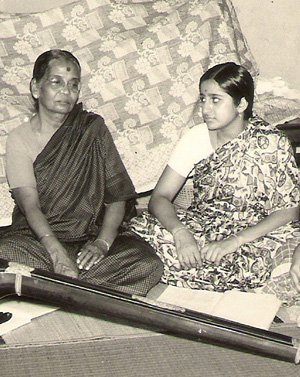
Aruna learning from her
Guru Sangeeta Kalanithi T. BrindaWhile her Guru Sangeeta Kalanithi T.Brinda bequeathed a rare repertoire of compositions by the South’s Trinity of saint-composers, Thyagaraja, Muthu Swamy Dikshitar and Shyama Shatri, Aruna also learnt from other Gurus while steadily making waves as an acclaimed vocalist
Shri S Ramachandran, from the bani (style) of Chittor Subramanya Pillai, expanded her already wide repertoire and taught her the fine nuances of nereval singing (improvising within poetic texts). AS Mani, a disciple of Tiger Vardacharyar, guided her through the creative process of swara singing (improvising with the sol-fa). Prof T R Subramanyam, an acclaimed music professor at Delhi University, shared with Aruna his expertise of singing and spontaneously composing within ragam-tanam-pallavi. KS Narayanaswamy, the respected veena maestro, taught her the subtlety of gamakas – the microtonal oscillations which hallmark and transport Carnatic music.
Despite imbibing and absorbing these riches, Aruna felt the need for guidance in voice training to acquire the physical capability to fully express her creativity and knowledge through her voice. During this search, she met German voice maestro Prof Eugene Rabine, who helped her discover and apply a completely new sound and emotion to her voice. Afterwards Aruna never looked back. She later had the benefit of advice and guidance from one of Carnatic music’s magisterial vocalists, Dr. Balamurali Krishna (popularly BMK). To this day, she remains in touch with voice masters such as the New York-based “Voice Teacher” David Jones.
In concert she continually strives to deliver a unique experience through new repertoire. Every year for the Chennai’s fabled December Season (which crams in around 2000 concerts), she prepares and composes new material for recitals. Her preparation might involve engaging in academic discussion with such intellects as the nadaswaram vidwan (shawm maestro) Shembannar Koil Vaidyanathan or the (Late) Pallavi Venkatarama Iyer in order to research special music forms, for example, the mallari – a form played during the inaugural processions in South Indian temples.
-
Heritage
Aruna’s guru Smt T Brinda hails from a family of royal court musicians from the court of Tanjore. That lineage traces itself back to her mother, Kamakshi, grandmother Veena Dhannammal, and then back to the earliest, the seventh generation, Papammal. All of them were eminent and highly respected women musicians. The family is proud of its musical treasures, especially the padam and javali forms – so rare in today’s concert repertoire. Very few musicians can claim to perform these genres. These songs are expressed through slow, subtle music, exploring the shringararasa (emotion (rasa) of love) and requiring complete immersion in the raga by the artist and listener. The padam form affords space for abhinaya – facial expression in dance. T Brinda’s cousin, T Balasaraswati was a legendary Bharatanatyam dancer and a padam master who performed in the United States and Europe in the 1950s and 1960s to rave audience reactions.
Aruna’s mother was drawn towards yet another genre – the compositions of Uttukadu Venkata Kavi [1700 – 1765]. This composer hailed from the village of Uttukadu (also rendered Oottukkadu) in the 18th Century. His compositions come from a tradition of music, dance and theatre and express an interplay of joy in technical brilliance. Aruna’s parental home was host to one of the scions of the Uttukadu family, Needamanagalam Krishnamurthy Bhagavathar, who spent months in their Mumbai home, performing and teaching these compositions. Aruna has played a key role in propagating these brilliant, yet relatively neglected compositions and revealing them on the contemporary concert stage.
The abhang is soulful music, traditionally sung by pilgrims as they travelled by foot to the temple of Lord Vitthala in Pandharpur, Maharashtra in western India. As they walk, they dance and sing abhangs expressing their devotion with spiritual abandon and engagement. Aruna’s interest in this form started with listening to the profound and passionate singing of leading satsang exponents who frequented her parental house. Roughly speaking in Indian philosophical terms, satsang is a ball of yarn that envelops seekers of, and seeking the truth. She was greatly influenced by Pandit Bhimsen Joshi's Abhangavani – a series of Abhang concerts.
-
Classical Performance
When on stage Aruna enters into another realm. The audience, while listening to her and watching her perform, experiences a timeless and spaceless sensation. Audiences pack her concerts. Her unique qualities render her music both virtuosic and one-off memorable. Her performances exude the living ginger of her academic and musical pedigree. For example, her ability to handle the highly aesthetic and eclectic padam form, the energised thillana form and ragam-tanam-pallavi– considered the highest challenge in Carnatic music – combines solid grooming and grounding and the spontaneity of the moment. Her compositions are further proof positive of her impeccable scholarship and musical passions.
-
-
-
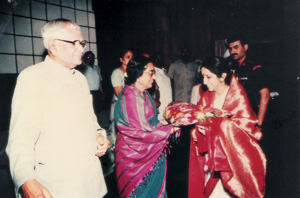
Being welcomed by President R. Venkataraman and the First Lady for her performance at The Rashtrapati Bhavan - 1992 Aruna has had the rare distinction of performing in such venues as the Indian President's official residence– Rashtrapati Bhavan, at Shakthi Sthal – and the memorials to Indian Prime Ministers, Indira Gandhi and Rajiv Gandhi at Vir Bhoomi. She has also performed across the length and breadth of the country, bringing the richness of South Indian classical music to people from all walks of life from major international cities to the humblest hamlets and rural villages.
A sample of the venues might include: The Music Academy, Chennai, the National Centre for the Performing Arts, Mumbai, Siri Fort Auditorium, Delhi, seminars and festivals of national importance such as those held at the Indira Gandhi National Centre for the Arts in Delhi,the Music Forum in Mumbai, and Kolkata’s Sangeet Research Academy.
-
-
-
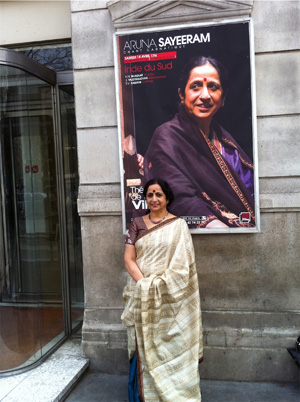
Aruna posing at the Theatre de la Ville, Paris prior to her performance in April 2012 Aruna was one of her generation’s pioneering vocalists in the sense of sensitising international audiences to the sound and feel of South Indian vocal music. Her first international experience as a visiting professor was at a German music conservatory where she taught South Indian music; it exposed her to a new world of impressions and seeded new insights. She was intrigued at the lack of awareness of her art form outside the subcontinent.
This experience gave her a new life mission: to make South Indian classical music global. One of the many instances when her dream saw fruition was when the BBC Proms invited her to perform at London’s Royal Albert Hall as the first South Indian classical vocalist in the Proms’ history – at that point in its 116-year history– in 2011. Aruna has also performed, among other important international venues, at New York’s Carnegie Hall, Théâtre de la Ville in Paris, and Morocco’s Fes Festival of World Sacred Music.
-
2009_01_26-.jpg) |
| Receiving the Padma Shri award from President Pratibha Patil - 2009 |
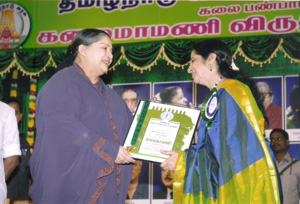 |
| Receiving the Kalaimamani Award from Tamil Nadu's Chief Minister Jayalalitha - 2006 |
Aruna considers herself deeply humbled and honoured by the many national and international awards conferred upon her. These include the Padma Shri and the US Congress Proclamation of Excellence, where upon the US national flag was flown atop the Capitol building with a special Congressional proclamation recognising her musical contribution.
- Padma Shri, Government of India – 2009
- Rajah Sir Annamalai Chettiar Award by Rajah Sir Annamalai Chettiar Memorial Trust Chennai - 2013
- U S Congress Proclamation of Excellence – 2008
- The “Kalaimamani” by the Government of Tamil Nadu – 2006
- Sangita Choodamani by Sri Krishna Gana Sabha Chennai – 2006
- Aruna Sairam has been appointed the Advisor to the Department of Culture, Tamil Nadu, on Musical Education by the Chief Minister of Tamil Nadu.
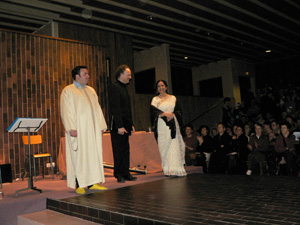 |
| Performing 'Trialogue' with Dominique Vellard and Noureddine Tahiri - 2004 |
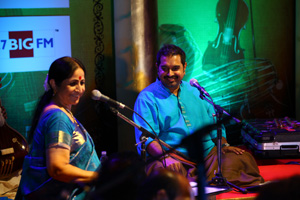 |
| On Stage with Bollywood maestro Shankar Mahadevan - 2012 |
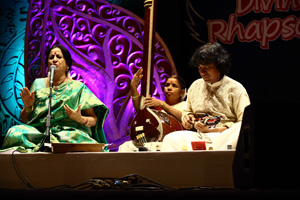 |
| On stage with Padma Sri U. Srinivas - 2012 |
In addition to the classical repertoire, Aruna has conceptualized and performed themed concerts.
‘Aruna – Thousand Names of Divine Mother’– is a concert and recording project first produced in Germany. The recording was done in the crypt of a Benedictine monastery in Germany with co-artists Christian Bollmann and Michael Reimann.
‘Sources’ – are a series of collaborations by Aruna and Dominique Vellard, a master of Gregorian and medieval song. The first, released by EMI Virgin, connects devotional music traditions from South India and medieval Europe. Aruna and Dominique went on to join forces with the Moroccan Sufi vocalist Noureddine Tahiri folding in music of the later Arab-Andalusian tradition, exemplified by their album ‘Trialogue’(2012).
‘Matrubhumi’– is a journey through India from the Himalayan top to the southern tip of Kanyakumari. This concert was performed with Shankar Mahadevan, the renowned Bollywood singer and music director of the Shankar-Ehsaan-Loy group.
‘Strains of Heaven’ – is a duet concert with celebrated mandolin maestro, Mandolin U Srinivas, exploring dialogues between the voice and the string. ‘Aikya’– is a concert in 14 Indian languages, celebrating India’s unity in diversity and saluting such national figureheads as Rabindranath Tagore and Gandhi.
‘The Wisdom of Vitthala’ and ‘Rang Ahang’ – are concerts fully dedicated to abhang in which Aruna sings and narrates stories about these songs. Both projects proved remarkable successes with audiences participating – chanting the name of Lord Vitthala – along with her.
To date Aruna has recorded over 50 records. Her recordings span classical repertoires, thematic presentations, concert recordings and collaborations with German, French, Moroccan and other international artists.
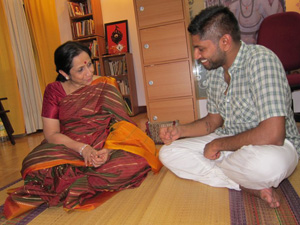 |
| With BBC World Routes Academy mentee - Hari Sivanesan - 2011 |
Aruna believes in the guru-shishya parampara, followed for generations in India. In this tradition the teacher hands down knowledge and experience to the student (shishya) creating a bond of mutual respect and trust. Aside from this, Aruna has undertaken various mentoring programmes, notably the 2011 BBC World Routes Academy Project – where she groomed the British-born, South Asian veena player, Hari Sivanesan. She also acted as ‘Musical Guru’ to a French singer of medieval chant, Marco Horvat, under the Indo-French Cultural Exchange Programme.
After her initial stint in the Music Conservatory in Germany, Aruna has continued to teach as guest lecturer in several schools across the European continent. She has also taught at “Harvard Sangeet” – a workshop on Carnatic Music for students of Harvard University, USA. She was also appointed by the Chief Minister of Tamil Nadu as an advisor to the Department of Culture, Tamil Nadu on Musical Education between 2007 and 2011.
Aruna is one of those rare, verbally lucid musicians whose intellectual and unaffectedly natural approach to music allows her to speak eloquently about her art and inspirations in ways that educate the connoisseur, the curious and casual audience member alike. Forums, musical and beyond, regularly invite to speak about her life, art and craft.
2011_09_14.jpg) |
| At a panel discussion on the 'Art and Science of Raga' with scholars and students - 2012 |
Aruna’s vision is to preserve the art of South Indian classical music for future generations. She is working towards this goal by inculcating the next generation into this form and by supporting all aspects of the art’s ‘ecosystem’– whether performing artists, accompanists, instrument makers, listeners, organisers, senior or junior musicians, music critics or journalists...and perhaps even gurus.
The Nadayogam Trust fosters every aspect of this ecosystem by giving performance opportunities to young musicians, facilitating a flow of knowledge from senior gurus to aspiring young musicians, encouraging dialogue between different groups that are engaged in music, and taking classical music to under privileged children. Additionally, this trust is dedicated to in-depth research in music. Aruna’s library consists of approximately 5000 books and rare records. The trust is currently devoted to archiving these records to make it accessible for public use.
Aruna Sairam has donated proceeds from her concerts and sale of her records to charitable causes such as cancer hospitals and to rehabilitate families of musicians who have passed away. She has performed for underprivileged children in orphanages in India and Malaysia.
- The Music Academy, Chennai, India
- The Royal Albert Hall, London, UK – Proms broadcast by BBC Radio 3
- Carnegie Hall, New York, USA
- Royce Hall, Los Angeles, USA
- World Music Institute, New York, USA
- Asia Society, New York, USA
- Théâtre de la Ville, Paris, France
- Radio France, Paris live concert broadcast all over Europe
- Swiss National Radio, Switzerland
- Museum Rietberg, Zurich, Switzerland
- Deutsche Welle (radio), Cologne, Germany
- National Television, Madrid, Spain
- Opening of Autumn series at Opéra National de Lyon, France
- Fes Festival of Sacred Music, Morocco
- The Festival of South Indian Music, Cité de la Musique, Paris, France
- The Sutra Festival of Music, Malaysia
- Koninklijk Instituut voor de Tropen, (Museum of the Royal Institute of the Tropics), Amsterdam, Netherlands
- Cleveland Festival USA, USA
- Singapore Indian Fine Arts Society Festival of Indian Classical Music & Dance, Esplanade, Singapore
Team
Aruna Sairam is ably supported by her team:
S. Parvathinathan is the creative consultant and advises on all musical and artistic ideas.
Gayatri Kamath is the business consultant and advises on international projects, marketing, operations and Nadayogam Trust Activities.
Sasikala Bharadwaj manages and oversees all the administration activities in the Chennai Office.
D. Hemavathi manages the website content is responsible for musical archiving and documentation.

